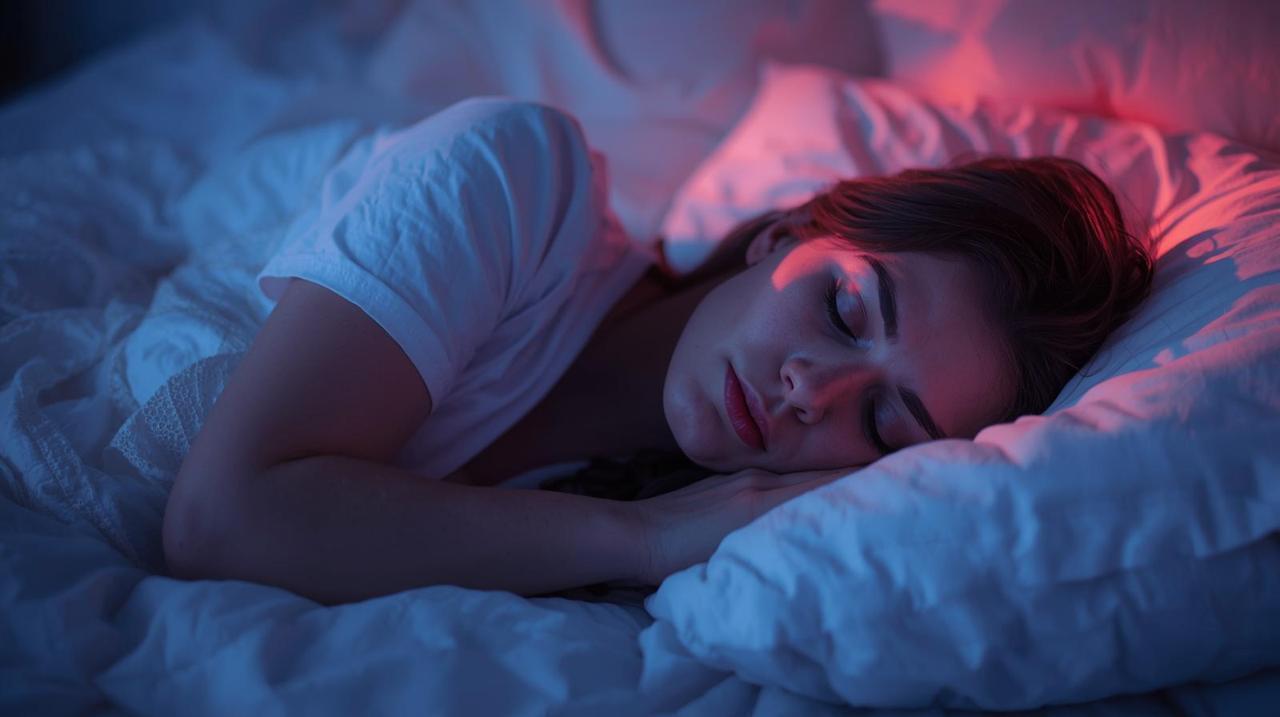
Post by : Sami Al-Rahmani
In our hectic lives, securing a good night’s sleep often feels elusive. With work pressures, screen time at all hours, and the constant buzz of daily responsibilities, many people suffer from sleep deprivation without even realizing it. However, quality sleep serves as the body’s innate healing and rejuvenation mechanism.
By understanding the science behind deep sleep, you can implement straightforward lifestyle adjustments that will enable you to fall asleep easier, enjoy longer rest, and wake up genuinely revived. Here, we will delve into how to naturally enhance your sleep, fortified by research and actionable tips for immediate application.
Sleep is far beyond a state of inactivity; it’s a vital biological process where essential mind and body functions occur. During sleep, your brain purges toxins, repairs cells, consolidates memories, and maintains hormonal balance.
Adequate rest is crucial; insufficient quality sleep depletes your cognitive abilities, emotional health, and physical well-being. Long-term lack of sleep has been linked to:
Increased anxiety and stress
Impaired immune function
Heightened risk of obesity, diabetes, and cardiovascular diseases
Reduced focus and judgment
Accelerated aging and tiredness
Recognizing these consequences paves the way for prioritizing sleep instead of treating it as an afterthought.
Every night, your body cycles through several stages of sleep cycles lasting approximately 90 minutes each, consisting of:
Light Sleep (Stages 1 & 2) – The beginning phase where your body unwinds and the heart rate decelerates.
Deep Sleep (Stage 3) – The most restorative phase, crucial for tissue repair, muscle building, and immune system enhancement.
REM Sleep (Rapid Eye Movement) – The stage where dreams occur and memories are consolidated.
Deep sleep, also referred to as slow-wave sleep, is indispensable for physical rejuvenation. Lacking this stage can leave you feeling tired, regardless of how many hours you’ve rested.
Your environment plays a vital role in your sleep quality. A clutered, noisy, or brightly lit room sends signals to your brain to remain alert. Conversely, a calm and dark space encourages relaxation.
Dim lights an hour before sleep to boost melatonin production.
Maintain a cool temperature in your bedroom, ideally between 18–22°C (65–72°F).
Use blackout curtains or sleep masks to eliminate light interference.
Refrain from screens for at least 60 minutes prior to bedtime, as blue light hinders melatonin release.
Invest in high-quality mattresses and pillows, which directly affect sleep quality.
A tranquil, tech-free haven is essential for restorative sleep.
Your body operates on a circadian rhythm, an internal clock governing sleep and wake cycles based on light exposure. Irregular sleep patterns disrupt this rhythm, leading to sleeplessness, fatigue, and brain fog.
Stick to the same sleep and wake times, including weekends.
Get morning sunlight to signal your body it's time to wake.
Limit exposure to bright light in the evening; use soft or dim lighting instead.
This consistency helps your body identify rest periods, enhancing your ability to naturally enter deep sleep.
Your daily nutrition significantly influences your sleep quality. While some foods energize, others help transition your body towards rest.
Bananas, almonds, and walnuts – high in magnesium and tryptophan.
Oats and yogurt – promote serotonin and melatonin release.
Herbal teas like chamomile and valerian – naturally soothe the nervous system.
Caffeine (found in coffee, tea, energy drinks, and chocolate) – remains in your system for hours.
Heavy or spicy meals, which can lead to indigestion and restlessness.
Alcohol, although it might induce drowsiness initially, disrupts REM sleep.
Your food choices impact not only your nutrition but also how your body reacts during sleep.
Consistent exercise can aid in falling asleep quicker and achieving deeper rest. It alleviates stress, enhances mood, and boosts circulation, contributing to better sleep.
However, exercise timing is critical. Working out too close to bedtime elevates body temperature and heart rate, complicating your ability to sleep.
Schedule workouts for the morning or early evening.
Incorporate yoga, stretching, or light walking before sleep for relaxation.
Avoid high-intensity workouts within three hours of going to bed.
Even a mere 30 minutes of daily physical activity can enhance your sleep duration and quality.
A racing mind is a significant obstacle to deep sleep. When your brain is preoccupied with worry or to-do lists, total relaxation becomes unattainable.
Adopting stress management techniques before bedtime can help lower cortisol levels (the stress hormone), prepping your body for sleep.
Practice deep breathing: inhale for four seconds, hold for seven, exhale for eight.
Engage in meditation or mindfulness journaling to clear mental clutter.
Listen to relaxing music or nature sounds.
Read a physical book instead of scrolling on digital screens.
Achieving mental serenity equals improved rest.
Brief daytime naps can be beneficial, but lengthy or irregular naps can disrupt nighttime sleep patterns. Similarly, stimulating activities like scrolling social media or watching TV can keep your mind engaged.
Restrict naps to 20–30 minutes before 3 p.m.
Establish a digital curfew — no devices an hour before bedtime.
Incorporate a relaxing bedtime routine: gentle stretching, skincare, reading, or gratitude journaling.
This helps cue your brain for a transition from activity to relaxation.
Sleep hygiene encompasses the daily practices that promote consistent, high-quality sleep. This involves priming both your environment and mindset for success.
Maintain a quiet, dark, and cool bedroom.
Adhere to a consistent sleep schedule.
Avoid evening stimulants.
Implement relaxation rituals before sleep.
Use your bed exclusively for sleep and intimacy, avoiding work or entertainment.
Enhancing your sleep hygiene conditions your body to associate bedtime with deep relaxation, as opposed to stress or stimulation.
Your brain thrives on schedules. Establishing a reliable nighttime routine signals your mind to unwind. Over time, this habit cues your body to relax.
9:00 PM – Power down electronics.
9:10 PM – Brew a cup of soothing herbal tea.
9:30 PM – Indulge in gentle stretching or reading.
10:00 PM – Engage in meditation or deep breathing.
10:15 PM – Turn off the lights.
Adhering to a predictable sequence allows you to fall asleep faster and enjoy continuous sleep.
If you’ve implemented various natural strategies yet find sleep elusive, consulting a sleep specialist may be wise. Persistent insomnia, snoring, or restless nights could indicate underlying conditions such as sleep apnea or anxiety disorders.
Expert assistance can help pinpoint the core issue and provide tailored solutions, including cognitive behavioral therapy for insomnia (CBT-I), which is known for its long-term effectiveness.
Attaining better sleep doesn't demand perfection; rather, it’s about recognizing your body's natural rhythms and adopting small, consistent changes to align with them.
By fostering a sleep-friendly environment, managing stress and diet, and adhering to a steady routine, you can significantly enhance both the quality and depth of your sleep.
Remember, sleep is not a lost opportunity; it serves as your body's vital tool for recovery, balance, and growth. Start tonight for a more focused, calm, and invigorated self tomorrow.










Shreyas Iyer in ICU in Sydney After Rib Injury During Third ODI
India ODI vice-captain Shreyas Iyer is in a Sydney ICU with internal bleeding from a rib injury sust

NBA Friday Highlights: Miami, Lakers, Milwaukee, and Clippers Triumph
Miami, Lakers, Bucks, and Clippers secure victories in thrilling NBA Friday games with standout perf

Doncic Dominates with 49 Points as Lakers Defeat Timberwolves 128-110
Luka Doncic scores 49 points to propel the Lakers past the Timberwolves 128-110; Reaves and Hachimur

Kings Narrowly Defeat Jazz 105-104 with Sabonis' Late Heroics
Domantas Sabonis' last-minute shot secures a thrilling 105-104 win for the Kings against the Jazz in

Argentina's Friendly Match with India Delayed, New Date to be Announced
Argentina's friendly against India in Kochi is postponed; a new date will be confirmed soon due to F

Rohit and Kohli Conclude ODI Journeys in Australia with a Win
Rohit Sharma and Virat Kohli close their ODI chapter in Australia with a win, partnering for an unbe